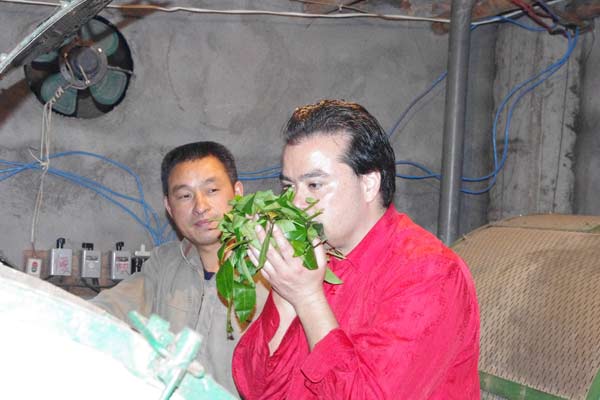 |
|
Warren Peltier savors fresh tea leaves at a tea farm in the Wuyi Mountains, Fujian province, in 2012. Photos provided to China Daily
|
Obsessive viewing of martial-arts films as a teenager didn't turn Warren Peltier into a fighter-instead he became fascinated with tea, eventually moving to Fujian province to pursue his passion and write a book about the brew. Sun Li chats to the man who loves a cuppa.
China's alcohol culture was the first thing Warren Peltier came into contact with when he arrived in the country in 2006.
The bespectacled English teacher enjoyed the rounds of toasts, an essential part of doing business in China, in which the drinker empties the glass in one gulp. He soon learned the tricks to avoid getting drunk, such as putting fruit in his beer and spitting the alcohol out when no one was watching.
But it was another beverage that drew Peltier to the Middle Kingdom.
"The only thing my life is consumed with is Chinese tea," Peltier says. "Chinese tea culture is a journey that has taken me across continents."
In 1987, Peltier, who grew up near the LaCloche Mountains of northern Ontario, Canada, started to study Chinese in high school.
"As there were few books on the language, no Internet and no satellite TV, my way of improving my Chinese language skills was watching Shaw Brothers martial arts films (with Chinese subtitles)," Peltier recalls.
The then 16-year-old noticed many films had fight scenes featuring gaiwan, a lidded bowl used for steeping and drinking tea in China.
"The kung fu masters hold the bowl when fighting and nothing breaks and no water spills throughout the process. It's so cool," Peltier says.
The films prompted Peltier to develop an interest in the brew, and he started to buy various kinds of teas.
He stumbled upon Tieguanyin, a type of oolong that originated in Fujian province, and was deeply fascinated by its fragrance.
"It's way better than the teabag tea. Not pungent. You don't need to put sugar in it as it tastes sweet by itself," Peltier says.
We Recommend:
